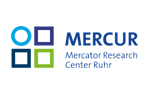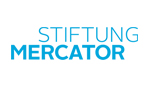In June 2013, the iFQ – Institute for Research Information and Quality Assurance carried out a survey of academics and researchers at the Ruhr-Universität Bochum, the TU Dortmund University and the University of Duisburg-Essen, to obtain an evaluation of the regional research funding institute, the Mercator Research Center Ruhr (MERCUR) by its target group (the academic staff of the three universities). The study was commissioned by the Stiftung Mercator. In order to obtain the most balanced assessment possible of MERCUR, the survey had multiple objectives. On the one hand, it was intended to systematically reflect the general funding context and the corresponding funding expectations at the three universities and to highlight MERCUR's role in this context. On the other hand, it was also intended to provide information on how the academics and researchers evaluate MERCUR, its application and selection procedures and the work of its office. For this reason, the academic staff who were entitled to apply were surveyed on a range of aspects:
- their familiarity with MERCUR, its targets and lines of funding
- evaluation of collaborative projects in research
- third-party funded activity of academics and researchers
- evaluation of the decision-making processes on assessing applications and of MERCUR's office
The online survey was addressed to the professors at the three universities and the postdoc academic staff (i.e. those who are entitled to apply to MERCUR) at the University of Duisburg-Essen. The questionnaire was designed by the iFQ based on questions formulated by MERCUR. The content and methods of the survey are in line with those of the iFQ Scientists Survey – barometer for the academic world.
The findings show that academics and researchers direct research applications to MERCUR for similar reasons as to other funding sources (such as the German Research Foundation or other foundations). For example, MERCUR applicants show a higher level of general third-party funded activity than non-applicants. Subject group-specific differences in applications for third-party funding are also reflected in the extent of applications to MERCUR. The criteria for selecting funding organisations are also, judging by the information, heavily influenced by professional status (professor or postdoc assistant) and by subject group.
The focus on collaborative projects and the corresponding funding aims, however, appear to be a characteristic which the academics and researchers of the UAMR see primarily as specific to MERCUR and which divides them into two opposing camps. Thus, critics of the funding organisation cite primarily that the focus on collaborative projects and the form of the lines of funding prevent them from submitting an application proposal, while supporters emphasise the openness of the lines of funding and the support for UAMR collaborative projects as an essential strength of MERCUR. Overall, the participants in the survey revealed a very positive image of MERCUR as an integral actor in implementing the UAMR's aims and cementing collaboration between the Ruhr-Universität Bochum, the TU Dortmund University and the University of Duisburg-Essen. Finally, the findings confirm that MERCUR contributes substantially to raising awareness of the UAMR's aims and strengthens understanding for the cross-university cooperation of academics and researchers.



